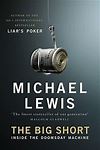For taking an ethics trip to the movies, you could hardly do better than The Big Short, Michael Lewis’s story of the of the few renegade financial fund managers who bet against the housing bubble. The whole thing is basically a morality play depicting the seemingly utter bankruptcy of those who handle enormous sums of money in our economy. And the filmmakers have done an exceptional job taking a story of a bunch of nerdy traders and an ending we all know, and making it into a gripping drama. At one point, Mark Baum and his associates, who run a fund and start trying to understand the housing market, meet with a couple fly-by-night mortgage brokers in Las Vegas, who share stories of “ninja” (no income, no job) loans that they can pass off to big banks a couple days after closing and collect their fees. Baum cannot believe what he is hearing because it sounds so fraudulent, but one of his associates says, “Mark, they’re not confessing, they’re bragging.” This moral world is literally upside down. And we get to see it.
Yet it’s a weird sort of morality play, because it’s not a movie that makes you feel good about anyone involved. Near the end, the filmmakers try to rescue the narrative with an imaginary future where hundreds of Wall Street bankers go to jail, the banks are broken up… and then there is a shattering of glass, and the narration says, “Instead, they do the usual, blame immigrants and poor people.” But much of this story actually defies this easy good guys-bad guys frame. One scene features Baum trying to explain to a Vegas stripper that she won’t be able to keep refinancing her adjustable rate loans at some point, and her housing payment is going to explode. She stops and says, “All my loans go up 200%?!” And he says, “What do you mean, all?” She replies, “I have five houses and a condo.” Unfortunately, everyone seems to have lost their moral compass in order to keep the money coming. Similarly, the “heroes” in the movie are an odd lot, particularly Ben Rickert, an ex-trader who has abandoned Wall Street to hide out and learn to grow his own food while waiting for the world to collapse. Two young garage traders, who are on to “the big short,” get him to help them gain access to the big boys’s trading network. At one point, the young guys start celebrating how much money they are going to make, and Rickert sternly rebukes them, asking them if they know how much suffering is going to be caused in the larger economy when this happens. Yet Rickert still helps them. Baum, at the end of the day, cashes in his positions at the opportune moment, even as he knows that the hated big bankers are going to get bailed out by the government. As hated as the bailout is, it does turn out that bringing down the big banks does mean bringing down the economy. Thus, rather than a good-versus-evil story, this movie is one of the better efforts to portray what a twisted structure of sin actually looks like from the inside. The incentive systems, for all players, have gone haywire. Though it is rough going at times, the movie makes a valiant attempt to explain exactly how the strange CDO’s and synthetic CDO’s actually work, where a massive network of bets and counter-bets end up existing on top of a much smaller pile of actual assets (the pile itself being… well, something of a pile). Even more importantly, we see how the small number of firms at the top have a market-making power that is all too easy for them to abuse. They are more or less running trades in all directions, and like the lame brokers on the ground, just need to keep collecting their fees before something goes bad. Coming off the worst are the rating agencies, which are supposed to be the third-party inspectors that give investors some trust in the assets they are buying.
Rather than a simple morality play, then, we really have a story about dumb, complacent insiders and crafty, straight-talking outsiders who really know what’s going on. Lewis loves these kinds of stories. His most recent book, Flash Boys, is the story of one banker who tries to bring down high-frequency trading operations. And of course, Moneyball is the same story in baseball. One interesting thing the movie seems to suggest is that the personal stories of the outsiders plays a big part in their willingness to buck conventional wisdom and get at the truth. Mike Burry, the trader who first discovers the problem, is a socially-awkward ex-doctor whose life is defined by having a glass eye that makes conversation difficult. Baum has been traumatized by the suicide of his brother. None of the main characters seem like they’d be comfortable company at casual dinner parties. This is actually a morally-interesting point in a society where we put such a high premium on inclusion and social ease. Is it possible that people who have to endure major social difficulties gain the resilience from this that they are willing to be the ones to question standard answers?
Another key element of the film is a relentless juxtaposition with a popular culture that (when it is not itself money-obsessed) functions as a general anesthetic. People spend way more time on Britney Spears and Barry Bonds and other forms of media pageantry than they do understanding the economy on which they depend. Certainly the vice of luxury is on display here (it’s no accident that the outsiders, while wealthy, eschew attention to appearance and display that the insiders instead crave). But the tone is actually more damning: People think the world is really about new iPhones and Facebook, not about serious coverage of the actual economy. It is no coincidence that the movie ends with a screen warning that in 2015, several banks began selling something calling a “bespoke tranche opportunity”… more or less another name for a CDO.
Perhaps refreshingly, the film doesn’t offer a simple solution to all this. Much as government oversight of some sort is sorely needed, it’s hard to understand that by itself solving the problem; instead, it seems like some sense of civic responsibility is necessary, as well as some way for transactions to recover more transparency. But it is a bit overwhelming to see how massive the money flows are, and to see that people who are at least paper-smart having so little sense of finance as serving any kind of public good. So many smart people, but is all this activity really generating additions to the economy? Does it help anyone? How would we know? I left the theatre wondering if perhaps we could find something else for all these smart people to do. They could run colleges, for instance.



